

Liste de concepts logiques. Neuroscientists reveal magicians' secrets - Technology & science - Science - LiveScience. NEW YORK — There is a place for magic in science.
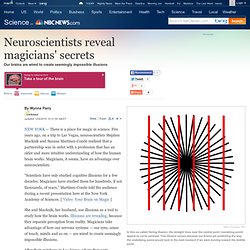
Five years ago, on a trip to Las Vegas, neuroscientists Stephen Macknik and Susana Martinez-Conde realized that a partnership was in order with a profession that has an older and more intuitive understanding of how the human brain works. Magicians, it seems, have an advantage over neuroscientists. "Scientists have only studied cognitive illusions for a few decades. Biais cognitif. Un article de Wikipédia, l'encyclopédie libre.
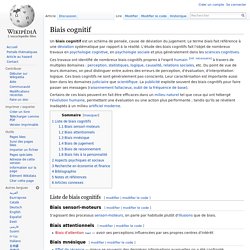
Un biais cognitif est un schéma de pensée, cause de déviation du jugement. Le terme biais fait référence à une déviation systématique par rapport à la réalité. Edge : Conversations on the edge of human knowledge. K21st – Essential 21st Century Knowledge. PlusConscient. Open Access Knowledge. Knowledge management. The Online Learning Blog from Study2U.
Supposedly browsing the internet requires more brain power than watching television.

Les Découvertes Impossibles - - Accueil. Amyscott.com/index.htm. Cultural Intelligence Center. WordVis, the visual dictionary. THE SOCIOLOGY OF KNOWLEDGE. Before we go any further here, has it ever occurred to any of you that all this is simply one grand misunderstanding?
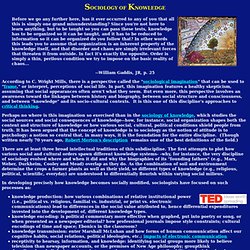
Since you're not here to learn anything, but to be taught so you can pass these tests, knowledge has to be organized so it can be taught, and it has to be reduced to information so it can be organized do you follow that? In other words this leads you to assume that organization is an inherent property of the knowledge itself, and that disorder and chaos are simply irrelevant forces that threaten it from outside. In fact it's exactly the opposite. Order is simply a thin, perilous condition we try to impose on the basic reality of chaos... --William Gaddis, JR, p. 25 According to C. There are at least three broad intellectual traditions of this subdiscipline.
Welcome to the best resource on the internet for the IB Diploma Theory of Knowledge course. How to create a knowledge ecosystem using digital tools. This article covers the content of the seminar that, today, December 6, 2011, I present at the Center for Research and Interdisciplinarity (CRI) in Paris, with the title: “Digital tools to create a knowledge ecosystem for learning and research”.
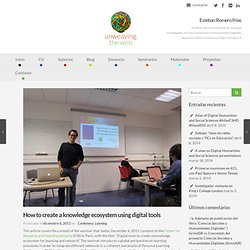
The seminar introduces a global perspective on learning processes in order to integrate different webtools in a coherent and practical Personal Learning Environment (PLE). I will use my own PLE to illustrate the practical role that a diverse array of webtools play in my learning process. Below you can find the presentation, videos and links to be used in the seminar. How to Test For One Hundred Percent Truth - the 3 Emergence Truth Tests. This article was written only months before I discovered the map of the mind.
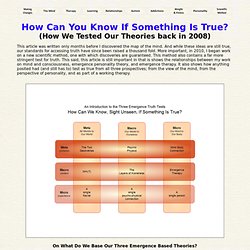
And while these ideas are still true, our standards for accessing truth have since been raised a thousand fold. More important, in 2010, I began work on a new scientific method, one with which discoveries are guaranteed. Les Infostratèges. Knowledge-tv.com. Droit de l'information. Une matière encore trop négligée Depuis la naissance des métiers de l'Information-Documentation, les professionnels ont particulièrement négligé les aspects juridiques de leur activité.
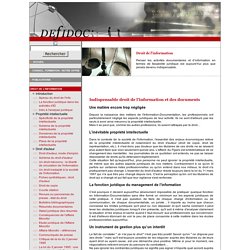
Ils ne sont d'ailleurs pas les seuls à avoir ainsi méconnu la propriété intellectuelle. Mais il se peut que, comme les autres professions, ils soient rattrapés par le droit… L’inévitable propriété intellectuelle Dans le contexte de la société de l'information, l'essentiel des enjeux économiques relève de la propriété intellectuelle et notamment du droit d'auteur (droit de copie, droit de représentation, etc.).
La fonction juridique du management de l’information C'est pourquoi il devient aujourd'hui absolument impossible de pratiquer quelque fonction en Information-Documentation sans être formé un minimum sur les aspects juridiques de cette pratique. Un instrument de gestion plus qu’un interdit Le fait de constater " Je n'ai pas le droit " n'est pas très positif. Knowledge & deep Search engine.
La Vie des idées. The W. Edwards Deming Institute: The W. Edwards Deming Institute. Information revolution. The term information revolution (sometimes called also the "informational revolution") describes current economic, social and technological trends beyond the Industrial Revolution.
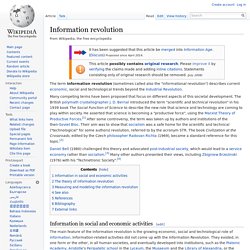
Many competing terms have been proposed that focus on different aspects of this societal development. The British polymath crystallographer J. D. Bernal introduced the term "scientific and technical revolution" in his 1939 book The Social Function of Science to describe the new role that science and technology are coming to play within society. Four stages of competence. In psychology, the four stages of competence, or the "conscious competence" learning model, relates to the psychological states involved in the process of progressing from incompetence to competence in a skill.
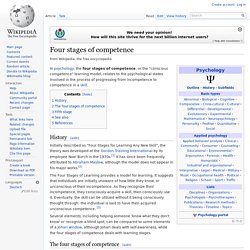
History[edit] The Four Stages of Learning provides a model for learning. It suggests that individuals are initially unaware of how little they know, or unconscious of their incompetence. As they recognize their incompetence, they consciously acquire a skill, then consciously use it. Eventually, the skill can be utilized without it being consciously thought through: the individual is said to have then acquired unconscious competence. [3] Several elements, including helping someone 'know what they don't know' or recognize a blind spot, can be compared to some elements of a Johari window, although Johari deals with self-awareness, while the four stages of competence deals with learning stages. The four stages of competence[edit] Fifth stage[edit] Kzone1.png (Image PNG, 1030x1019 pixels) - Redimensionnée (77%)